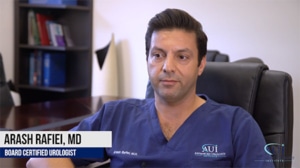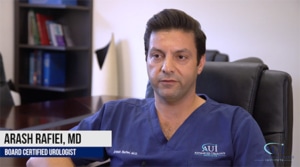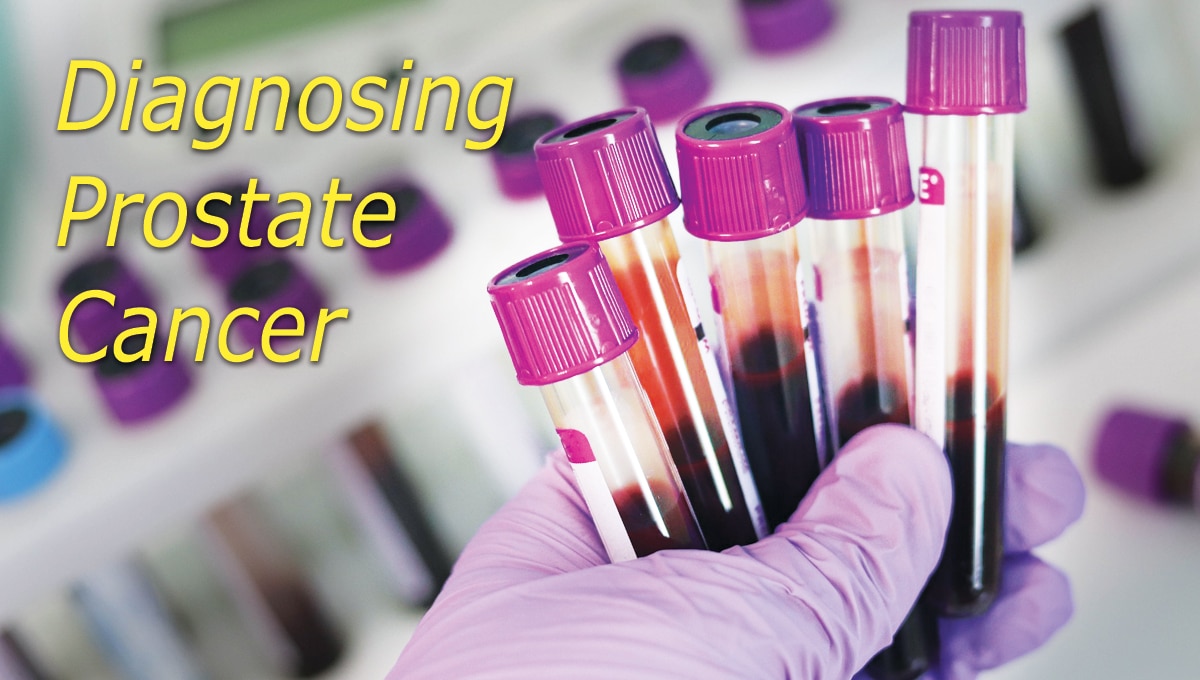Explore the journey of becoming a physician assistant and enhancing patient care here at our office in Orange City, FL.
Continue readingBecoming a Specialist in the Field of Urology
Discover expert care with a specialist in the field of urology. Our dedicated team in Orange City and Daytona Beach, FL are here to help.
Continue readingQuynh Dao Tonnu, PA-C: Removal Procedures for Kidney Stones
Discover effective removal procedures for kidney stones from Quynh Dao-Tonnu, a physician assistant in Orange City, FL.
Continue readingUnderstanding Advanced Prostate Cancer with Chelsie Ferrell, PA
Chelsie Ferrell, physician assistant in Orange City, FL talks about the importance of understanding advanced prostate cancer.
Continue readingProstate Cancer Types of Treatment
Prostate cancer is one of the most prevalent types of cancer men face. According to board certified urologist Dr. Arash Rafiei, “One in nine men will have prostate cancer in their lifetime.” Although somewhat common, not all cancers in the walnut-shaped prostate gland are the same. Every case of prostate cancer is different and affects men differently. Urologists work with their patients to find the most effective treatment option based on each patient’s individual needs.
 Urologists will consider their patient’s health, age, and the type cancer when deciding how to proceed. For some cases, the best treatment is none at all. When a patient has slow growing prostate cancer that is not spreading, a urologist may suggest holding off on treatment while monitoring the growth through routine appointments. The cancer needs to be taken seriously and watched closely, but invasive treatment is not always necessary for the patient’s health.
Urologists will consider their patient’s health, age, and the type cancer when deciding how to proceed. For some cases, the best treatment is none at all. When a patient has slow growing prostate cancer that is not spreading, a urologist may suggest holding off on treatment while monitoring the growth through routine appointments. The cancer needs to be taken seriously and watched closely, but invasive treatment is not always necessary for the patient’s health.
When treatment for the prostate cancer is needed, there are two main options: radiation and surgery. Both options offer the same level of prostate control and urologists will discuss the pros and cons of each with their patients. For surgical options the urologist may suggest a radical prostatectomy or robotic surgery. Both are well-tested invasive options that produce very good patient outcomes.
Radiation therapy is another common cancer treatment option. The radiation is centered on the prostate to kill cancer cells. The radiation will also kill some healthy cells as well, causing side effects. This is a non-invasive option that, like surgery, has its pros and con that a patient and doctor will want to discuss. Follow-up appointments to determine if the cancer responded to the treatment will also be necessary.
In addition to radiation and surgery, there are also some newer options that can be utilized in prostate cancer treatment. For instance, cryotherapy uses very cold temperatures to kill cancerous tissues and cells in the prostate by freezing them. There are also treatments using intense ultrasound waves centered on the prostate to destroy the cancer cells. These procedures are newer and there is less data on when they are the most effective, but they are options to consider.
All cancer is serious and can be a stressful and frightening prospect. Having a dedicated urologist who will listen and suggest the best treatment for each patient is key to success. Whether the best option is observation, radiation, surgery or a newer procedure, the Advance Urology Institute is a team of dedicated urologists with an array of treatment options for their patients.
What is the best treatment for enlarged prostate?
All men can experience difficulties caused by an enlarging prostate. As Board Certified Urologist Dr. Arash Rafiei says, “All men have prostates, and as we age our prostates enlarge, some more than others.” Yet each man’s situation and health is different. The symptoms of an enlarged prostate will differ greatly between individuals and the best treatment option for one may not be the best option for another.
 For most men, the symptoms of an enlarging prostate include the slowing of their urine stream, pushing to urinate, and having to go to the bathroom frequently. Many men also have the feeling of not fully emptying their bladder after urination. In many cases, men will find that they need to wake up multiple times in the night to go to the bathroom.
For most men, the symptoms of an enlarging prostate include the slowing of their urine stream, pushing to urinate, and having to go to the bathroom frequently. Many men also have the feeling of not fully emptying their bladder after urination. In many cases, men will find that they need to wake up multiple times in the night to go to the bathroom.
Because the symptoms of an enlarging prostate differ for everyone, the first thing a urologist will ask is if the symptoms are bothering the patient. For some men, the symptoms, especially in their early stages, are not a problem. Men may notice that they urinate a little more often. It may also take a bit longer for them to urinate when they do. They may have to get up once or twice at night when they did not have to before. A lot of men see these symptoms as inconveniences that they can adapt to and live easily with. In these cases, the urologist and their patient will just want to continue to watch the situation and may not need to take any action.
For men with more severe prostate enlargement the symptoms may be causing issues that are negatively affecting their lives. In these cases, their urologist may recommend medical therapy. Urologists will recommend medication that will help slow the growth of the prostate and relax the muscles around the bladder. This treatment will help make urination easier for men you have been experiencing difficulties. Slowing prostate growth will also give the patient more time before more invasive treatment options become necessary.
For cases where medication does not produce successful outcomes there are plenty of procedures that can help. One common procedure is a transurethral resection of the prostate. For this procedure a resectoscope in inserted through the tip of the penis and into the urethra. The urologist uses this device to trim away excess tissue on the prostate, relieving pressure on the urethra. This is an outpatient procedure and often helps relieve the patient’s urinary problems.
Another procedure that is new and becoming more common for treating enlarged prostates is Urolift. For this cutting-edge treatment, a urologist separates and lifts the prostate from the urethra using a suture, relieving pressure on the urethra and allowing better urine flow. A plus side to Urolift is that, unlike in a transurethral resection, no prostate tissue is removed allowing for quicker recovery. Most patients return home the same day as the procedure.
Having plenty of treatment options is the key to successfully managing prostate enlargement. The urologists at Advance Urology Institute get to know and understand their patients in order to find the best option for each individual. For more information, visit the Advanced Urology Institute website.
Diagnosing Prostate Cancer
Prostate cancer is the most frequently diagnosed cancer for men, with nearly 10 percent of all men getting it in their senior years. About 99 percent of all prostate cancers occur in men over 50 years old, though younger men should not ignore its risk. While it is one of the most common cancers for men, it also has some of the best survival chances, with over 98 percent of all men diagnosed with prostate cancer surviving at least another five years. This is in part because most prostate cancers grow slowly, and also because there are a lot of simple techniques to notice and diagnose its presence. After diagnosis, there are many effective treatments; however, nearly one out of every 41 men will die from prostate cancer.
Just as women should regularly check their breasts for lumps, men also should check their groin areas. However, that is not commonly taught by most doctors to their male patients, so men should ask their doctors how to do self-examinations.
Other signs that men can check could include any one or more of the following:
- The need to urinate more frequently
- Difficulty in starting to urinate
- Having a weak urine flow (it seems to come out too slow)
- Needing to sometimes rush to the toilet
- Straining to urinate, feeling one’s bladder has not really emptied
- Blood in either your urine or semen (which means something serious!)
 A patient with any one of these symptoms should discuss them with his doctor. If a man has more than one of the symptoms for a week or more, he should see a doctor as soon as possible to check on possible causes. There are also more potentially treatable physical problems not related to the prostate gland that might cause those problems. A general practitioner through some simple tests should be able to then know if a urologist would be required.
A patient with any one of these symptoms should discuss them with his doctor. If a man has more than one of the symptoms for a week or more, he should see a doctor as soon as possible to check on possible causes. There are also more potentially treatable physical problems not related to the prostate gland that might cause those problems. A general practitioner through some simple tests should be able to then know if a urologist would be required.
Those uncomfortable “digital” rectal exams (DRE) men are asked to undergo can also detect prostate cancer, as well as another non-cancerous condition that can cause an enlarged prostate (BPH). If a general practitioner detects something unusual from a DRE that seems to be prostate-related, a prostate-specific antigen (PSA) blood test usually will be ordered. PSA is a prostrate-made substance that will tend to increase when men have cancer, inflammation, or even a simple infection of the prostate gland. Medical specialists will know when the PSA counts require specialists like those at the Advanced Urology Institute to further examine the patient.
A urology clinic can do most, if not all the following tests to determine if prostate cancer is the problem. They can use a transrectal ultrasound to get an ultrasound picture of the prostate gland and surrounding tissues. X-rays can detect if a cancer has potentially spread in a visible way. If the urologists determine there clearly are issues with the prostate, they perform a biopsy to discover the grade of the cancer, to discover how potentially aggressive the cancer is. A transrectal magnetic resonance imaging (MRI) may be required since some types of prostate cancer can spread out of the prostate into surrounding tissues and bones. Bone scans also may be utilized. Genetic tests on the biopsied tissues will help determine how aggressive the cancer may be. The clinic may use other types of exams and tests, depending upon medical findings.
After the urologist has completed the medical evaluations, the chances of recovery, the prognosis, can be discussed with the patient as well as the treatment options. The board-certified specialists at various clinics of the Advanced Urology Institute have years of experience working with patients, giving them the best advice for each of their unique situations. For more information, visit the Advanced Urology Institute website.








